Legislation, Ethics and CSR in Travel and Tourism Sector
VerifiedAdded on 2020/11/12
|16
|5219
|282
Report
AI Summary
This report provides a detailed analysis of the legal and ethical considerations within the travel and tourism sector. It begins by presenting the legal and regulatory framework, including key legislation such as the Development of Tourism Act and Transport Acts, and the roles of organizations like IATA and ABTA. The report then examines surface, sea, and air transport laws concerning passenger carriage, including the Carriage by Railway Act, the International Maritime Organization, the Warsaw Convention, and the Montreal Conference. The impact of health, safety, and security legislation, including the Health and Safety Act and the Data Protection Act, is evaluated, alongside legislation related to equality, such as the Human Rights Act and the Disability Discrimination Act. Furthermore, the report explains contract and consumer protection legislation relevant to travel and tourism customers. Finally, it addresses ethical dilemmas faced by the industry and presents the Corporate Social Responsibility (CSR) policy of Thomas Cook, offering a comprehensive overview of the sector's legal and ethical landscape.
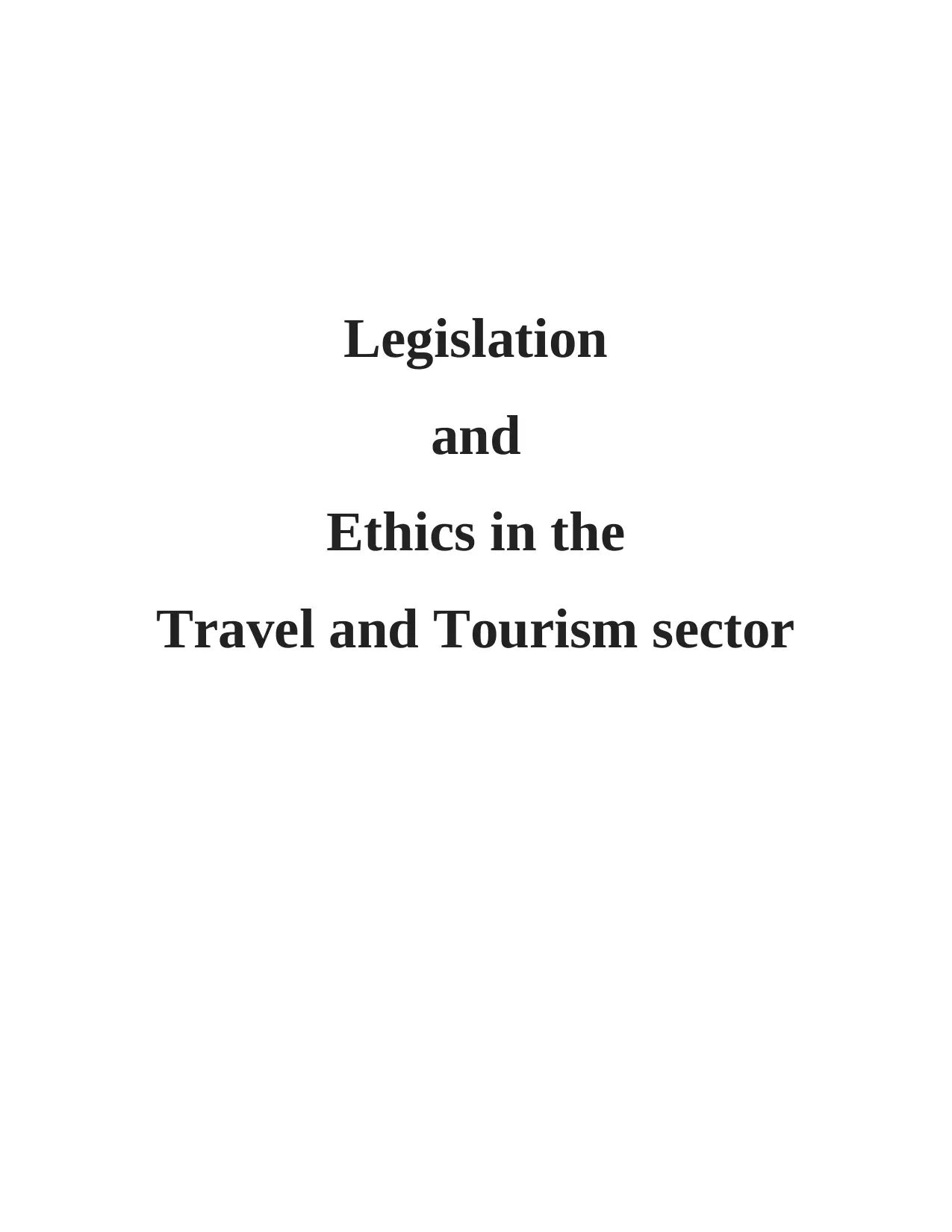
Legislation
and
Ethics in the
Travel and Tourism sector
and
Ethics in the
Travel and Tourism sector
Paraphrase This Document
Need a fresh take? Get an instant paraphrase of this document with our AI Paraphraser
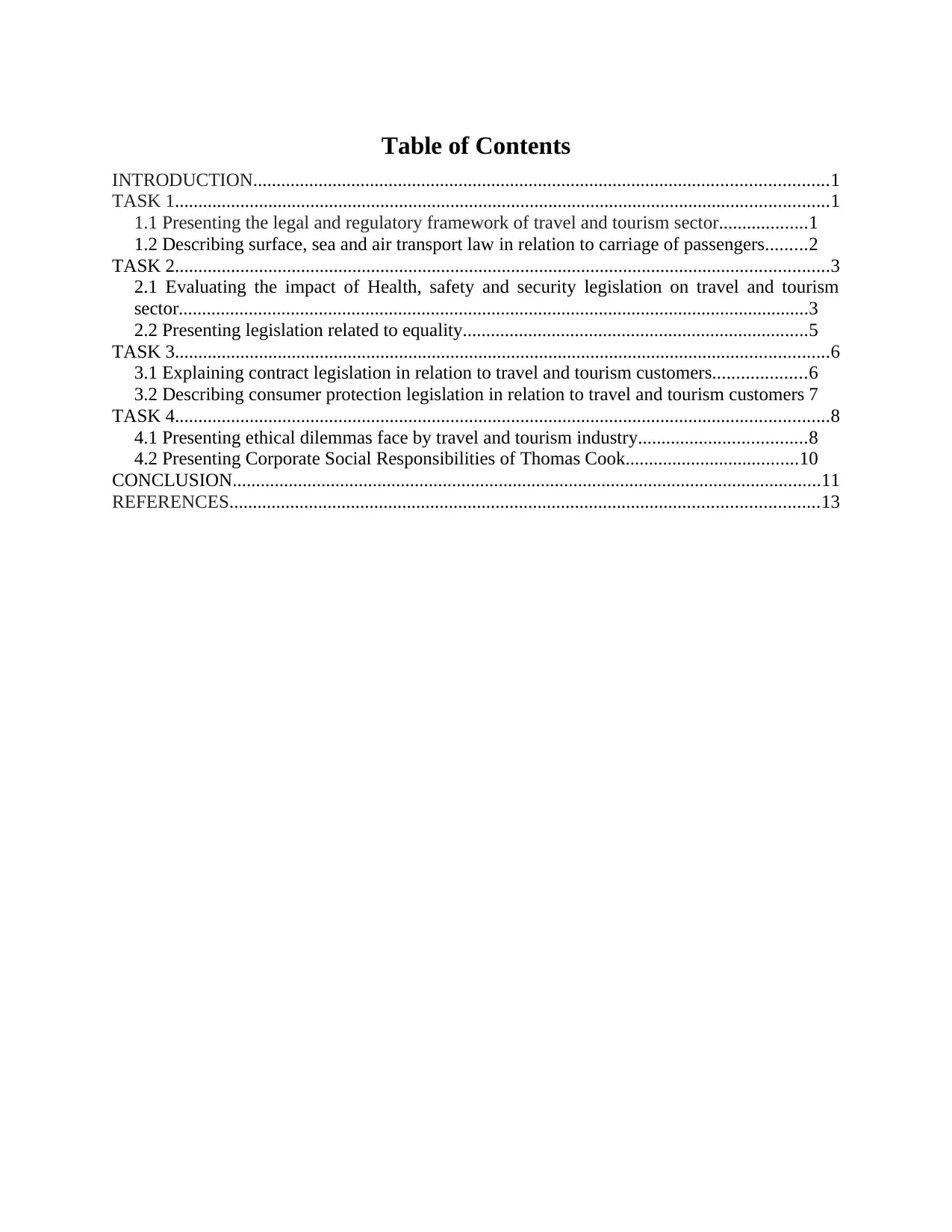
Table of Contents
INTRODUCTION...........................................................................................................................1
TASK 1............................................................................................................................................1
1.1 Presenting the legal and regulatory framework of travel and tourism sector...................1
1.2 Describing surface, sea and air transport law in relation to carriage of passengers.........2
TASK 2............................................................................................................................................3
2.1 Evaluating the impact of Health, safety and security legislation on travel and tourism
sector.......................................................................................................................................3
2.2 Presenting legislation related to equality..........................................................................5
TASK 3............................................................................................................................................6
3.1 Explaining contract legislation in relation to travel and tourism customers....................6
3.2 Describing consumer protection legislation in relation to travel and tourism customers 7
TASK 4............................................................................................................................................8
4.1 Presenting ethical dilemmas face by travel and tourism industry....................................8
4.2 Presenting Corporate Social Responsibilities of Thomas Cook.....................................10
CONCLUSION..............................................................................................................................11
REFERENCES..............................................................................................................................13
INTRODUCTION...........................................................................................................................1
TASK 1............................................................................................................................................1
1.1 Presenting the legal and regulatory framework of travel and tourism sector...................1
1.2 Describing surface, sea and air transport law in relation to carriage of passengers.........2
TASK 2............................................................................................................................................3
2.1 Evaluating the impact of Health, safety and security legislation on travel and tourism
sector.......................................................................................................................................3
2.2 Presenting legislation related to equality..........................................................................5
TASK 3............................................................................................................................................6
3.1 Explaining contract legislation in relation to travel and tourism customers....................6
3.2 Describing consumer protection legislation in relation to travel and tourism customers 7
TASK 4............................................................................................................................................8
4.1 Presenting ethical dilemmas face by travel and tourism industry....................................8
4.2 Presenting Corporate Social Responsibilities of Thomas Cook.....................................10
CONCLUSION..............................................................................................................................11
REFERENCES..............................................................................................................................13
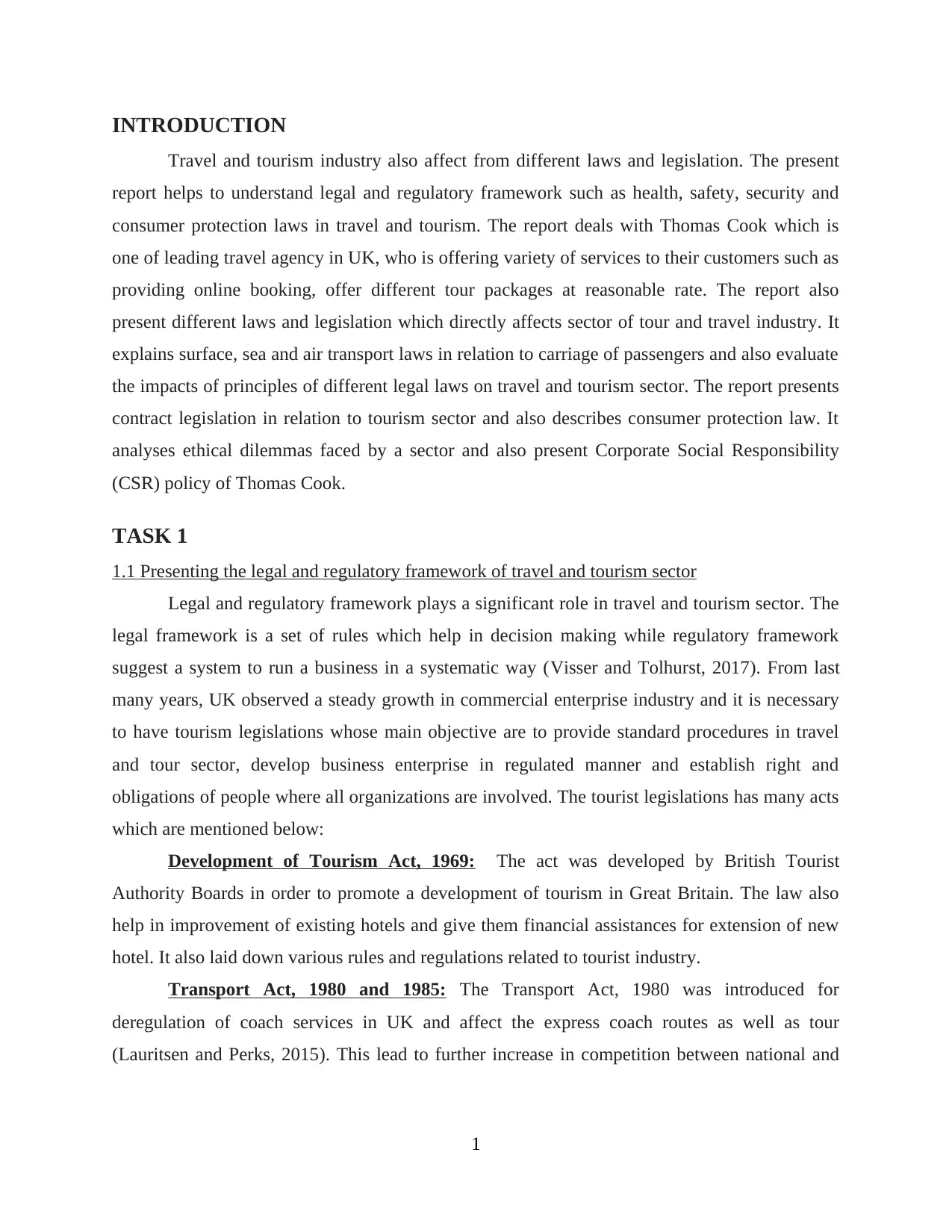
INTRODUCTION
Travel and tourism industry also affect from different laws and legislation. The present
report helps to understand legal and regulatory framework such as health, safety, security and
consumer protection laws in travel and tourism. The report deals with Thomas Cook which is
one of leading travel agency in UK, who is offering variety of services to their customers such as
providing online booking, offer different tour packages at reasonable rate. The report also
present different laws and legislation which directly affects sector of tour and travel industry. It
explains surface, sea and air transport laws in relation to carriage of passengers and also evaluate
the impacts of principles of different legal laws on travel and tourism sector. The report presents
contract legislation in relation to tourism sector and also describes consumer protection law. It
analyses ethical dilemmas faced by a sector and also present Corporate Social Responsibility
(CSR) policy of Thomas Cook.
TASK 1
1.1 Presenting the legal and regulatory framework of travel and tourism sector
Legal and regulatory framework plays a significant role in travel and tourism sector. The
legal framework is a set of rules which help in decision making while regulatory framework
suggest a system to run a business in a systematic way (Visser and Tolhurst, 2017). From last
many years, UK observed a steady growth in commercial enterprise industry and it is necessary
to have tourism legislations whose main objective are to provide standard procedures in travel
and tour sector, develop business enterprise in regulated manner and establish right and
obligations of people where all organizations are involved. The tourist legislations has many acts
which are mentioned below:
Development of Tourism Act, 1969: The act was developed by British Tourist
Authority Boards in order to promote a development of tourism in Great Britain. The law also
help in improvement of existing hotels and give them financial assistances for extension of new
hotel. It also laid down various rules and regulations related to tourist industry.
Transport Act, 1980 and 1985: The Transport Act, 1980 was introduced for
deregulation of coach services in UK and affect the express coach routes as well as tour
(Lauritsen and Perks, 2015). This lead to further increase in competition between national and
1
Travel and tourism industry also affect from different laws and legislation. The present
report helps to understand legal and regulatory framework such as health, safety, security and
consumer protection laws in travel and tourism. The report deals with Thomas Cook which is
one of leading travel agency in UK, who is offering variety of services to their customers such as
providing online booking, offer different tour packages at reasonable rate. The report also
present different laws and legislation which directly affects sector of tour and travel industry. It
explains surface, sea and air transport laws in relation to carriage of passengers and also evaluate
the impacts of principles of different legal laws on travel and tourism sector. The report presents
contract legislation in relation to tourism sector and also describes consumer protection law. It
analyses ethical dilemmas faced by a sector and also present Corporate Social Responsibility
(CSR) policy of Thomas Cook.
TASK 1
1.1 Presenting the legal and regulatory framework of travel and tourism sector
Legal and regulatory framework plays a significant role in travel and tourism sector. The
legal framework is a set of rules which help in decision making while regulatory framework
suggest a system to run a business in a systematic way (Visser and Tolhurst, 2017). From last
many years, UK observed a steady growth in commercial enterprise industry and it is necessary
to have tourism legislations whose main objective are to provide standard procedures in travel
and tour sector, develop business enterprise in regulated manner and establish right and
obligations of people where all organizations are involved. The tourist legislations has many acts
which are mentioned below:
Development of Tourism Act, 1969: The act was developed by British Tourist
Authority Boards in order to promote a development of tourism in Great Britain. The law also
help in improvement of existing hotels and give them financial assistances for extension of new
hotel. It also laid down various rules and regulations related to tourist industry.
Transport Act, 1980 and 1985: The Transport Act, 1980 was introduced for
deregulation of coach services in UK and affect the express coach routes as well as tour
(Lauritsen and Perks, 2015). This lead to further increase in competition between national and
1
⊘ This is a preview!⊘
Do you want full access?
Subscribe today to unlock all pages.

Trusted by 1+ million students worldwide
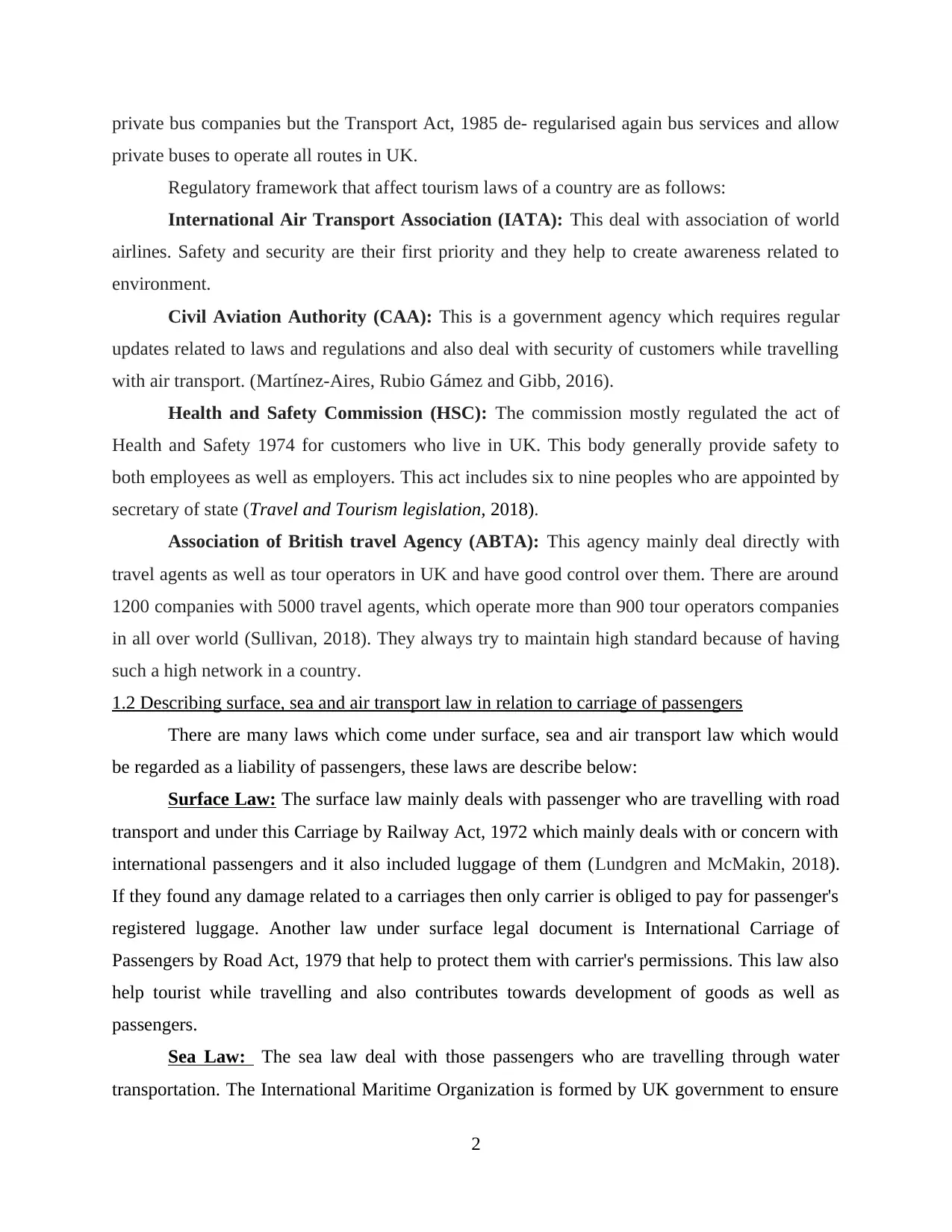
private bus companies but the Transport Act, 1985 de- regularised again bus services and allow
private buses to operate all routes in UK.
Regulatory framework that affect tourism laws of a country are as follows:
International Air Transport Association (IATA): This deal with association of world
airlines. Safety and security are their first priority and they help to create awareness related to
environment.
Civil Aviation Authority (CAA): This is a government agency which requires regular
updates related to laws and regulations and also deal with security of customers while travelling
with air transport. (Martínez-Aires, Rubio Gámez and Gibb, 2016).
Health and Safety Commission (HSC): The commission mostly regulated the act of
Health and Safety 1974 for customers who live in UK. This body generally provide safety to
both employees as well as employers. This act includes six to nine peoples who are appointed by
secretary of state (Travel and Tourism legislation, 2018).
Association of British travel Agency (ABTA): This agency mainly deal directly with
travel agents as well as tour operators in UK and have good control over them. There are around
1200 companies with 5000 travel agents, which operate more than 900 tour operators companies
in all over world (Sullivan, 2018). They always try to maintain high standard because of having
such a high network in a country.
1.2 Describing surface, sea and air transport law in relation to carriage of passengers
There are many laws which come under surface, sea and air transport law which would
be regarded as a liability of passengers, these laws are describe below:
Surface Law: The surface law mainly deals with passenger who are travelling with road
transport and under this Carriage by Railway Act, 1972 which mainly deals with or concern with
international passengers and it also included luggage of them (Lundgren and McMakin, 2018).
If they found any damage related to a carriages then only carrier is obliged to pay for passenger's
registered luggage. Another law under surface legal document is International Carriage of
Passengers by Road Act, 1979 that help to protect them with carrier's permissions. This law also
help tourist while travelling and also contributes towards development of goods as well as
passengers.
Sea Law: The sea law deal with those passengers who are travelling through water
transportation. The International Maritime Organization is formed by UK government to ensure
2
private buses to operate all routes in UK.
Regulatory framework that affect tourism laws of a country are as follows:
International Air Transport Association (IATA): This deal with association of world
airlines. Safety and security are their first priority and they help to create awareness related to
environment.
Civil Aviation Authority (CAA): This is a government agency which requires regular
updates related to laws and regulations and also deal with security of customers while travelling
with air transport. (Martínez-Aires, Rubio Gámez and Gibb, 2016).
Health and Safety Commission (HSC): The commission mostly regulated the act of
Health and Safety 1974 for customers who live in UK. This body generally provide safety to
both employees as well as employers. This act includes six to nine peoples who are appointed by
secretary of state (Travel and Tourism legislation, 2018).
Association of British travel Agency (ABTA): This agency mainly deal directly with
travel agents as well as tour operators in UK and have good control over them. There are around
1200 companies with 5000 travel agents, which operate more than 900 tour operators companies
in all over world (Sullivan, 2018). They always try to maintain high standard because of having
such a high network in a country.
1.2 Describing surface, sea and air transport law in relation to carriage of passengers
There are many laws which come under surface, sea and air transport law which would
be regarded as a liability of passengers, these laws are describe below:
Surface Law: The surface law mainly deals with passenger who are travelling with road
transport and under this Carriage by Railway Act, 1972 which mainly deals with or concern with
international passengers and it also included luggage of them (Lundgren and McMakin, 2018).
If they found any damage related to a carriages then only carrier is obliged to pay for passenger's
registered luggage. Another law under surface legal document is International Carriage of
Passengers by Road Act, 1979 that help to protect them with carrier's permissions. This law also
help tourist while travelling and also contributes towards development of goods as well as
passengers.
Sea Law: The sea law deal with those passengers who are travelling through water
transportation. The International Maritime Organization is formed by UK government to ensure
2
Paraphrase This Document
Need a fresh take? Get an instant paraphrase of this document with our AI Paraphraser
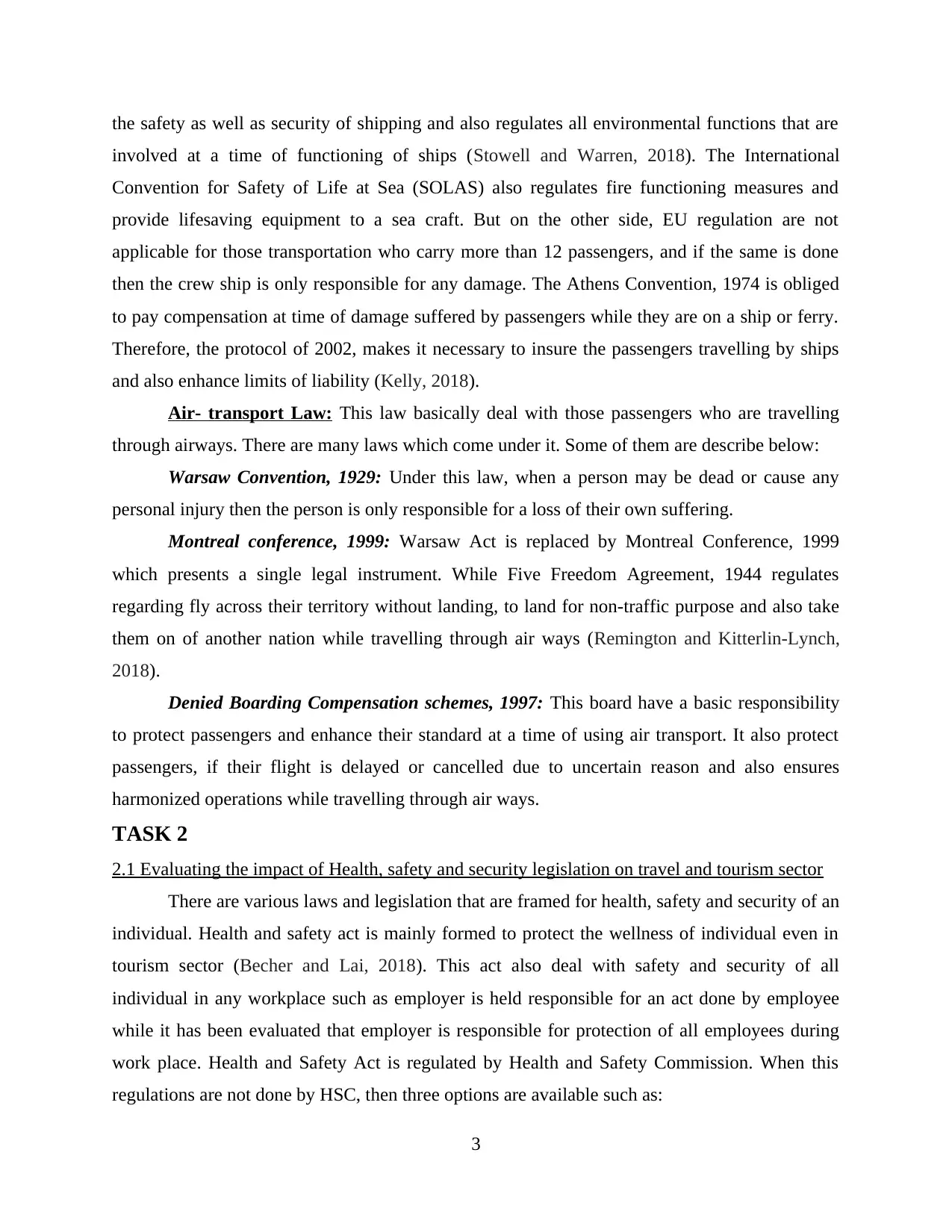
the safety as well as security of shipping and also regulates all environmental functions that are
involved at a time of functioning of ships (Stowell and Warren, 2018). The International
Convention for Safety of Life at Sea (SOLAS) also regulates fire functioning measures and
provide lifesaving equipment to a sea craft. But on the other side, EU regulation are not
applicable for those transportation who carry more than 12 passengers, and if the same is done
then the crew ship is only responsible for any damage. The Athens Convention, 1974 is obliged
to pay compensation at time of damage suffered by passengers while they are on a ship or ferry.
Therefore, the protocol of 2002, makes it necessary to insure the passengers travelling by ships
and also enhance limits of liability (Kelly, 2018).
Air- transport Law: This law basically deal with those passengers who are travelling
through airways. There are many laws which come under it. Some of them are describe below:
Warsaw Convention, 1929: Under this law, when a person may be dead or cause any
personal injury then the person is only responsible for a loss of their own suffering.
Montreal conference, 1999: Warsaw Act is replaced by Montreal Conference, 1999
which presents a single legal instrument. While Five Freedom Agreement, 1944 regulates
regarding fly across their territory without landing, to land for non-traffic purpose and also take
them on of another nation while travelling through air ways (Remington and Kitterlin-Lynch,
2018).
Denied Boarding Compensation schemes, 1997: This board have a basic responsibility
to protect passengers and enhance their standard at a time of using air transport. It also protect
passengers, if their flight is delayed or cancelled due to uncertain reason and also ensures
harmonized operations while travelling through air ways.
TASK 2
2.1 Evaluating the impact of Health, safety and security legislation on travel and tourism sector
There are various laws and legislation that are framed for health, safety and security of an
individual. Health and safety act is mainly formed to protect the wellness of individual even in
tourism sector (Becher and Lai, 2018). This act also deal with safety and security of all
individual in any workplace such as employer is held responsible for an act done by employee
while it has been evaluated that employer is responsible for protection of all employees during
work place. Health and Safety Act is regulated by Health and Safety Commission. When this
regulations are not done by HSC, then three options are available such as:
3
involved at a time of functioning of ships (Stowell and Warren, 2018). The International
Convention for Safety of Life at Sea (SOLAS) also regulates fire functioning measures and
provide lifesaving equipment to a sea craft. But on the other side, EU regulation are not
applicable for those transportation who carry more than 12 passengers, and if the same is done
then the crew ship is only responsible for any damage. The Athens Convention, 1974 is obliged
to pay compensation at time of damage suffered by passengers while they are on a ship or ferry.
Therefore, the protocol of 2002, makes it necessary to insure the passengers travelling by ships
and also enhance limits of liability (Kelly, 2018).
Air- transport Law: This law basically deal with those passengers who are travelling
through airways. There are many laws which come under it. Some of them are describe below:
Warsaw Convention, 1929: Under this law, when a person may be dead or cause any
personal injury then the person is only responsible for a loss of their own suffering.
Montreal conference, 1999: Warsaw Act is replaced by Montreal Conference, 1999
which presents a single legal instrument. While Five Freedom Agreement, 1944 regulates
regarding fly across their territory without landing, to land for non-traffic purpose and also take
them on of another nation while travelling through air ways (Remington and Kitterlin-Lynch,
2018).
Denied Boarding Compensation schemes, 1997: This board have a basic responsibility
to protect passengers and enhance their standard at a time of using air transport. It also protect
passengers, if their flight is delayed or cancelled due to uncertain reason and also ensures
harmonized operations while travelling through air ways.
TASK 2
2.1 Evaluating the impact of Health, safety and security legislation on travel and tourism sector
There are various laws and legislation that are framed for health, safety and security of an
individual. Health and safety act is mainly formed to protect the wellness of individual even in
tourism sector (Becher and Lai, 2018). This act also deal with safety and security of all
individual in any workplace such as employer is held responsible for an act done by employee
while it has been evaluated that employer is responsible for protection of all employees during
work place. Health and Safety Act is regulated by Health and Safety Commission. When this
regulations are not done by HSC, then three options are available such as:
3
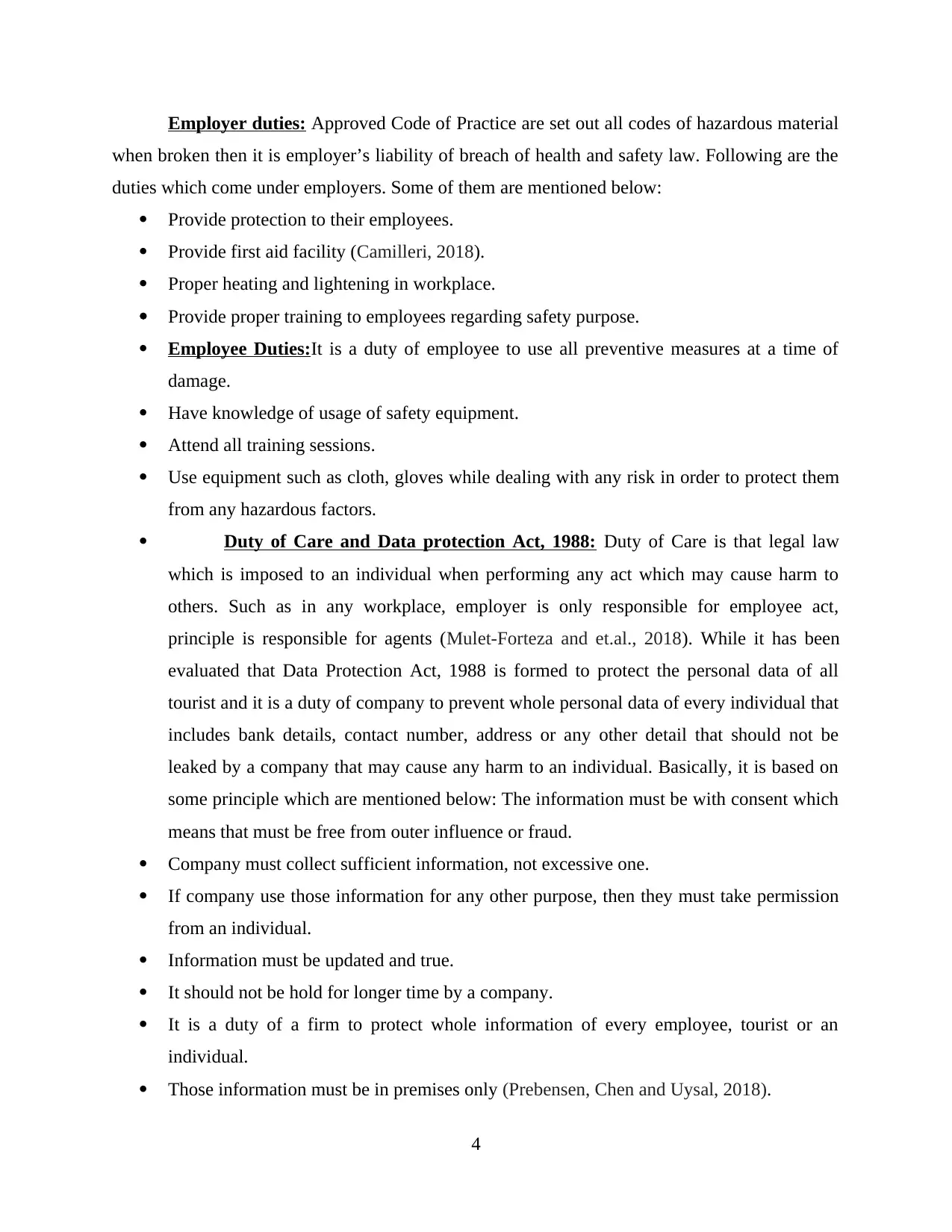
Employer duties: Approved Code of Practice are set out all codes of hazardous material
when broken then it is employer’s liability of breach of health and safety law. Following are the
duties which come under employers. Some of them are mentioned below:
Provide protection to their employees.
Provide first aid facility (Camilleri, 2018).
Proper heating and lightening in workplace.
Provide proper training to employees regarding safety purpose.
Employee Duties:It is a duty of employee to use all preventive measures at a time of
damage.
Have knowledge of usage of safety equipment.
Attend all training sessions.
Use equipment such as cloth, gloves while dealing with any risk in order to protect them
from any hazardous factors.
Duty of Care and Data protection Act, 1988: Duty of Care is that legal law
which is imposed to an individual when performing any act which may cause harm to
others. Such as in any workplace, employer is only responsible for employee act,
principle is responsible for agents (Mulet-Forteza and et.al., 2018). While it has been
evaluated that Data Protection Act, 1988 is formed to protect the personal data of all
tourist and it is a duty of company to prevent whole personal data of every individual that
includes bank details, contact number, address or any other detail that should not be
leaked by a company that may cause any harm to an individual. Basically, it is based on
some principle which are mentioned below: The information must be with consent which
means that must be free from outer influence or fraud.
Company must collect sufficient information, not excessive one.
If company use those information for any other purpose, then they must take permission
from an individual.
Information must be updated and true.
It should not be hold for longer time by a company.
It is a duty of a firm to protect whole information of every employee, tourist or an
individual.
Those information must be in premises only (Prebensen, Chen and Uysal, 2018).
4
when broken then it is employer’s liability of breach of health and safety law. Following are the
duties which come under employers. Some of them are mentioned below:
Provide protection to their employees.
Provide first aid facility (Camilleri, 2018).
Proper heating and lightening in workplace.
Provide proper training to employees regarding safety purpose.
Employee Duties:It is a duty of employee to use all preventive measures at a time of
damage.
Have knowledge of usage of safety equipment.
Attend all training sessions.
Use equipment such as cloth, gloves while dealing with any risk in order to protect them
from any hazardous factors.
Duty of Care and Data protection Act, 1988: Duty of Care is that legal law
which is imposed to an individual when performing any act which may cause harm to
others. Such as in any workplace, employer is only responsible for employee act,
principle is responsible for agents (Mulet-Forteza and et.al., 2018). While it has been
evaluated that Data Protection Act, 1988 is formed to protect the personal data of all
tourist and it is a duty of company to prevent whole personal data of every individual that
includes bank details, contact number, address or any other detail that should not be
leaked by a company that may cause any harm to an individual. Basically, it is based on
some principle which are mentioned below: The information must be with consent which
means that must be free from outer influence or fraud.
Company must collect sufficient information, not excessive one.
If company use those information for any other purpose, then they must take permission
from an individual.
Information must be updated and true.
It should not be hold for longer time by a company.
It is a duty of a firm to protect whole information of every employee, tourist or an
individual.
Those information must be in premises only (Prebensen, Chen and Uysal, 2018).
4
⊘ This is a preview!⊘
Do you want full access?
Subscribe today to unlock all pages.

Trusted by 1+ million students worldwide
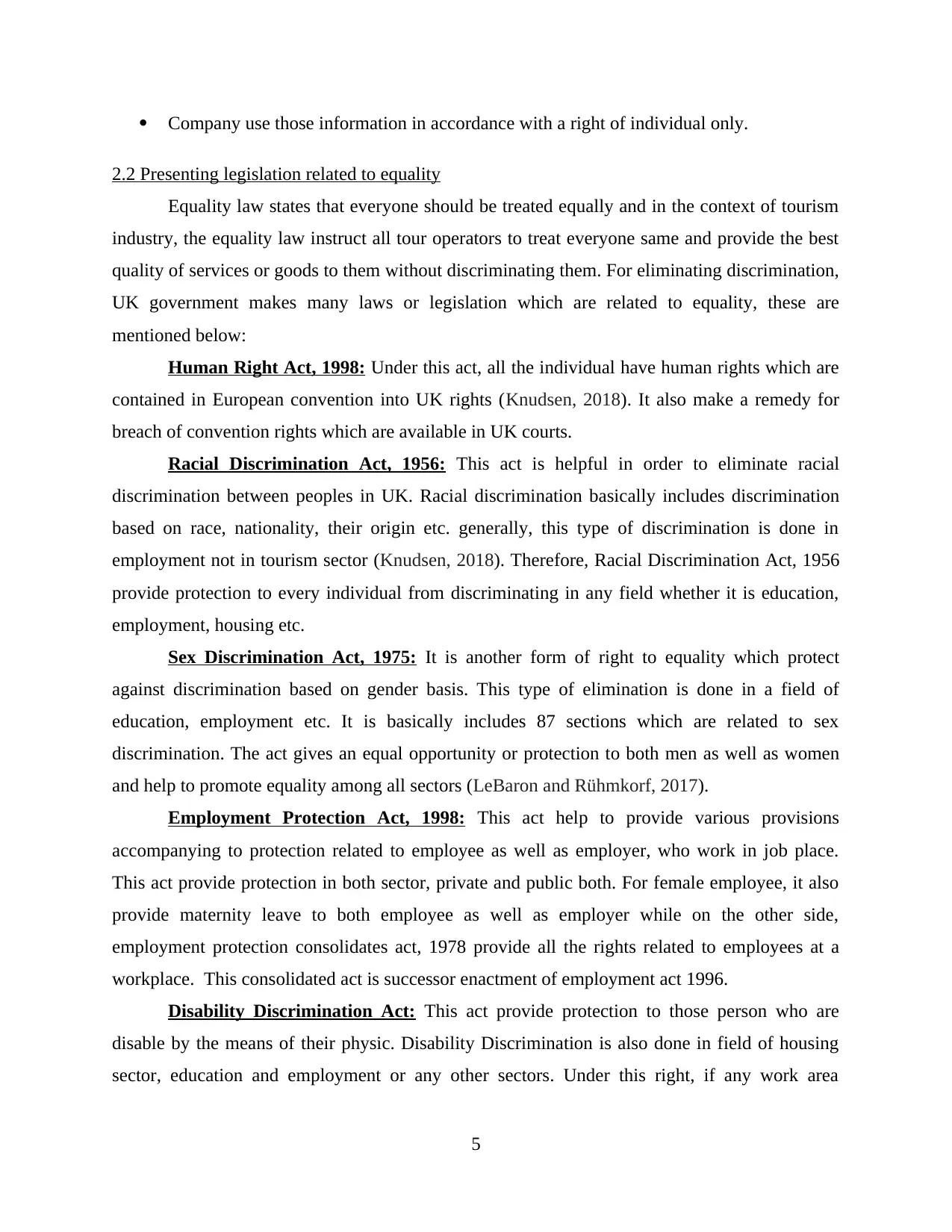
Company use those information in accordance with a right of individual only.
2.2 Presenting legislation related to equality
Equality law states that everyone should be treated equally and in the context of tourism
industry, the equality law instruct all tour operators to treat everyone same and provide the best
quality of services or goods to them without discriminating them. For eliminating discrimination,
UK government makes many laws or legislation which are related to equality, these are
mentioned below:
Human Right Act, 1998: Under this act, all the individual have human rights which are
contained in European convention into UK rights (Knudsen, 2018). It also make a remedy for
breach of convention rights which are available in UK courts.
Racial Discrimination Act, 1956: This act is helpful in order to eliminate racial
discrimination between peoples in UK. Racial discrimination basically includes discrimination
based on race, nationality, their origin etc. generally, this type of discrimination is done in
employment not in tourism sector (Knudsen, 2018). Therefore, Racial Discrimination Act, 1956
provide protection to every individual from discriminating in any field whether it is education,
employment, housing etc.
Sex Discrimination Act, 1975: It is another form of right to equality which protect
against discrimination based on gender basis. This type of elimination is done in a field of
education, employment etc. It is basically includes 87 sections which are related to sex
discrimination. The act gives an equal opportunity or protection to both men as well as women
and help to promote equality among all sectors (LeBaron and Rühmkorf, 2017).
Employment Protection Act, 1998: This act help to provide various provisions
accompanying to protection related to employee as well as employer, who work in job place.
This act provide protection in both sector, private and public both. For female employee, it also
provide maternity leave to both employee as well as employer while on the other side,
employment protection consolidates act, 1978 provide all the rights related to employees at a
workplace. This consolidated act is successor enactment of employment act 1996.
Disability Discrimination Act: This act provide protection to those person who are
disable by the means of their physic. Disability Discrimination is also done in field of housing
sector, education and employment or any other sectors. Under this right, if any work area
5
2.2 Presenting legislation related to equality
Equality law states that everyone should be treated equally and in the context of tourism
industry, the equality law instruct all tour operators to treat everyone same and provide the best
quality of services or goods to them without discriminating them. For eliminating discrimination,
UK government makes many laws or legislation which are related to equality, these are
mentioned below:
Human Right Act, 1998: Under this act, all the individual have human rights which are
contained in European convention into UK rights (Knudsen, 2018). It also make a remedy for
breach of convention rights which are available in UK courts.
Racial Discrimination Act, 1956: This act is helpful in order to eliminate racial
discrimination between peoples in UK. Racial discrimination basically includes discrimination
based on race, nationality, their origin etc. generally, this type of discrimination is done in
employment not in tourism sector (Knudsen, 2018). Therefore, Racial Discrimination Act, 1956
provide protection to every individual from discriminating in any field whether it is education,
employment, housing etc.
Sex Discrimination Act, 1975: It is another form of right to equality which protect
against discrimination based on gender basis. This type of elimination is done in a field of
education, employment etc. It is basically includes 87 sections which are related to sex
discrimination. The act gives an equal opportunity or protection to both men as well as women
and help to promote equality among all sectors (LeBaron and Rühmkorf, 2017).
Employment Protection Act, 1998: This act help to provide various provisions
accompanying to protection related to employee as well as employer, who work in job place.
This act provide protection in both sector, private and public both. For female employee, it also
provide maternity leave to both employee as well as employer while on the other side,
employment protection consolidates act, 1978 provide all the rights related to employees at a
workplace. This consolidated act is successor enactment of employment act 1996.
Disability Discrimination Act: This act provide protection to those person who are
disable by the means of their physic. Disability Discrimination is also done in field of housing
sector, education and employment or any other sectors. Under this right, if any work area
5
Paraphrase This Document
Need a fresh take? Get an instant paraphrase of this document with our AI Paraphraser
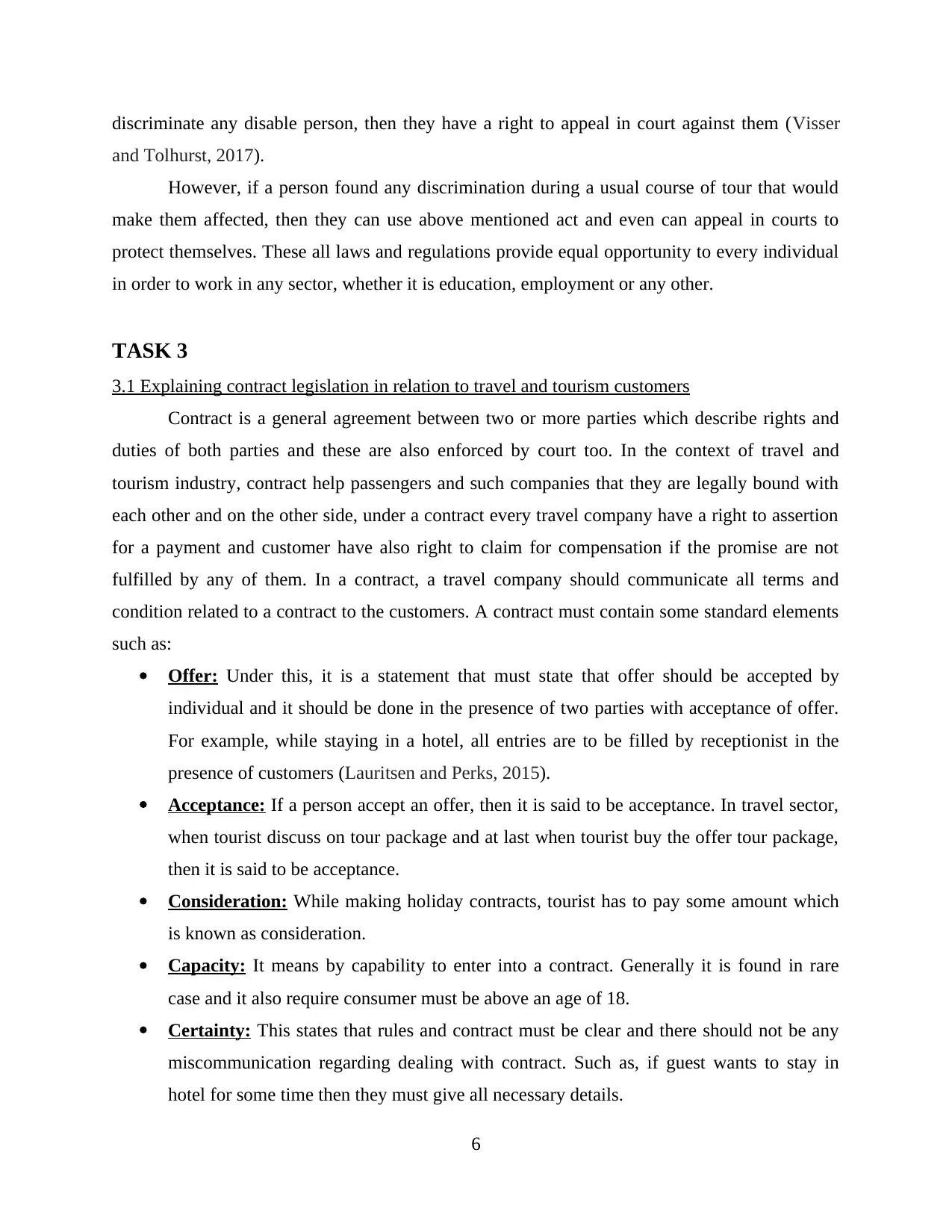
discriminate any disable person, then they have a right to appeal in court against them (Visser
and Tolhurst, 2017).
However, if a person found any discrimination during a usual course of tour that would
make them affected, then they can use above mentioned act and even can appeal in courts to
protect themselves. These all laws and regulations provide equal opportunity to every individual
in order to work in any sector, whether it is education, employment or any other.
TASK 3
3.1 Explaining contract legislation in relation to travel and tourism customers
Contract is a general agreement between two or more parties which describe rights and
duties of both parties and these are also enforced by court too. In the context of travel and
tourism industry, contract help passengers and such companies that they are legally bound with
each other and on the other side, under a contract every travel company have a right to assertion
for a payment and customer have also right to claim for compensation if the promise are not
fulfilled by any of them. In a contract, a travel company should communicate all terms and
condition related to a contract to the customers. A contract must contain some standard elements
such as:
Offer: Under this, it is a statement that must state that offer should be accepted by
individual and it should be done in the presence of two parties with acceptance of offer.
For example, while staying in a hotel, all entries are to be filled by receptionist in the
presence of customers (Lauritsen and Perks, 2015).
Acceptance: If a person accept an offer, then it is said to be acceptance. In travel sector,
when tourist discuss on tour package and at last when tourist buy the offer tour package,
then it is said to be acceptance.
Consideration: While making holiday contracts, tourist has to pay some amount which
is known as consideration.
Capacity: It means by capability to enter into a contract. Generally it is found in rare
case and it also require consumer must be above an age of 18.
Certainty: This states that rules and contract must be clear and there should not be any
miscommunication regarding dealing with contract. Such as, if guest wants to stay in
hotel for some time then they must give all necessary details.
6
and Tolhurst, 2017).
However, if a person found any discrimination during a usual course of tour that would
make them affected, then they can use above mentioned act and even can appeal in courts to
protect themselves. These all laws and regulations provide equal opportunity to every individual
in order to work in any sector, whether it is education, employment or any other.
TASK 3
3.1 Explaining contract legislation in relation to travel and tourism customers
Contract is a general agreement between two or more parties which describe rights and
duties of both parties and these are also enforced by court too. In the context of travel and
tourism industry, contract help passengers and such companies that they are legally bound with
each other and on the other side, under a contract every travel company have a right to assertion
for a payment and customer have also right to claim for compensation if the promise are not
fulfilled by any of them. In a contract, a travel company should communicate all terms and
condition related to a contract to the customers. A contract must contain some standard elements
such as:
Offer: Under this, it is a statement that must state that offer should be accepted by
individual and it should be done in the presence of two parties with acceptance of offer.
For example, while staying in a hotel, all entries are to be filled by receptionist in the
presence of customers (Lauritsen and Perks, 2015).
Acceptance: If a person accept an offer, then it is said to be acceptance. In travel sector,
when tourist discuss on tour package and at last when tourist buy the offer tour package,
then it is said to be acceptance.
Consideration: While making holiday contracts, tourist has to pay some amount which
is known as consideration.
Capacity: It means by capability to enter into a contract. Generally it is found in rare
case and it also require consumer must be above an age of 18.
Certainty: This states that rules and contract must be clear and there should not be any
miscommunication regarding dealing with contract. Such as, if guest wants to stay in
hotel for some time then they must give all necessary details.
6
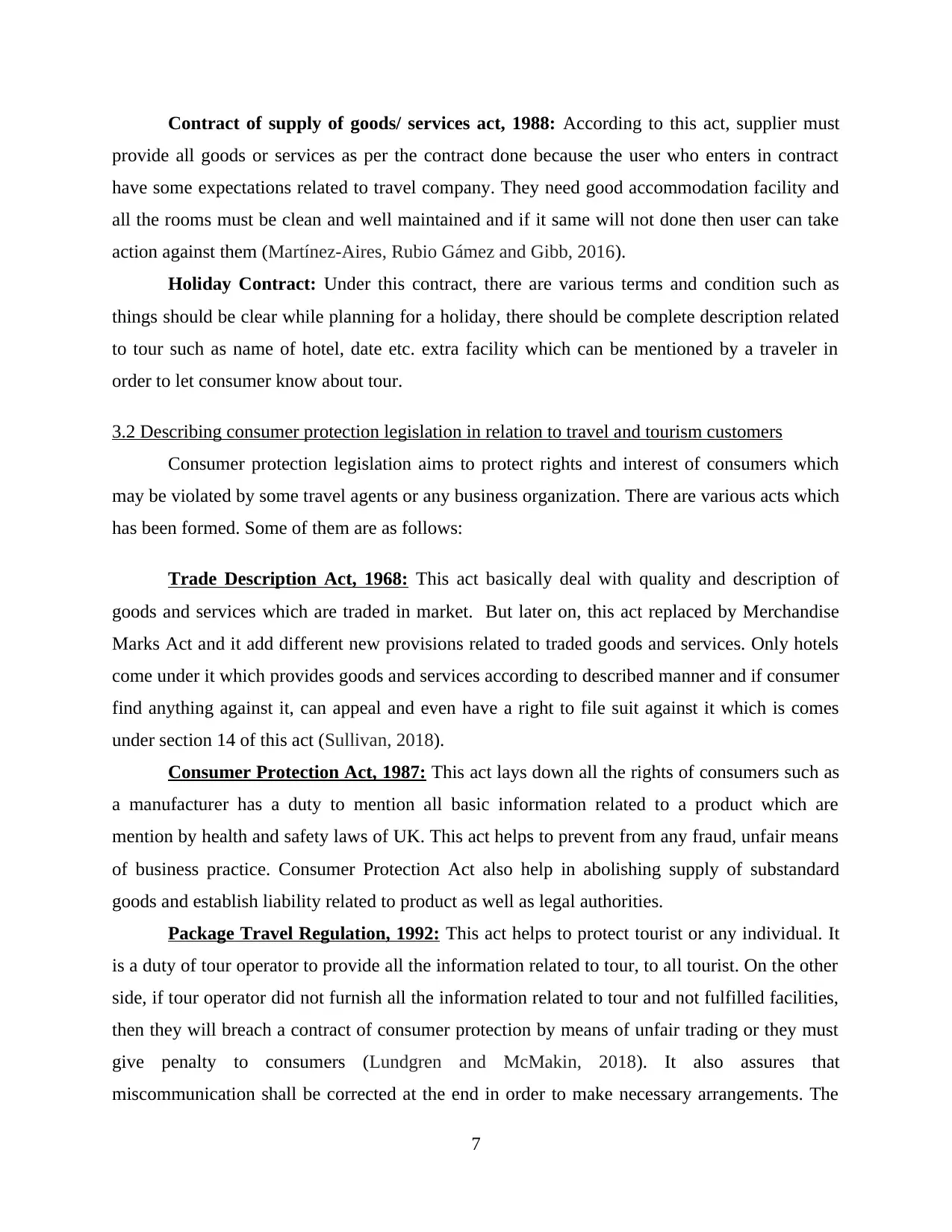
Contract of supply of goods/ services act, 1988: According to this act, supplier must
provide all goods or services as per the contract done because the user who enters in contract
have some expectations related to travel company. They need good accommodation facility and
all the rooms must be clean and well maintained and if it same will not done then user can take
action against them (Martínez-Aires, Rubio Gámez and Gibb, 2016).
Holiday Contract: Under this contract, there are various terms and condition such as
things should be clear while planning for a holiday, there should be complete description related
to tour such as name of hotel, date etc. extra facility which can be mentioned by a traveler in
order to let consumer know about tour.
3.2 Describing consumer protection legislation in relation to travel and tourism customers
Consumer protection legislation aims to protect rights and interest of consumers which
may be violated by some travel agents or any business organization. There are various acts which
has been formed. Some of them are as follows:
Trade Description Act, 1968: This act basically deal with quality and description of
goods and services which are traded in market. But later on, this act replaced by Merchandise
Marks Act and it add different new provisions related to traded goods and services. Only hotels
come under it which provides goods and services according to described manner and if consumer
find anything against it, can appeal and even have a right to file suit against it which is comes
under section 14 of this act (Sullivan, 2018).
Consumer Protection Act, 1987: This act lays down all the rights of consumers such as
a manufacturer has a duty to mention all basic information related to a product which are
mention by health and safety laws of UK. This act helps to prevent from any fraud, unfair means
of business practice. Consumer Protection Act also help in abolishing supply of substandard
goods and establish liability related to product as well as legal authorities.
Package Travel Regulation, 1992: This act helps to protect tourist or any individual. It
is a duty of tour operator to provide all the information related to tour, to all tourist. On the other
side, if tour operator did not furnish all the information related to tour and not fulfilled facilities,
then they will breach a contract of consumer protection by means of unfair trading or they must
give penalty to consumers (Lundgren and McMakin, 2018). It also assures that
miscommunication shall be corrected at the end in order to make necessary arrangements. The
7
provide all goods or services as per the contract done because the user who enters in contract
have some expectations related to travel company. They need good accommodation facility and
all the rooms must be clean and well maintained and if it same will not done then user can take
action against them (Martínez-Aires, Rubio Gámez and Gibb, 2016).
Holiday Contract: Under this contract, there are various terms and condition such as
things should be clear while planning for a holiday, there should be complete description related
to tour such as name of hotel, date etc. extra facility which can be mentioned by a traveler in
order to let consumer know about tour.
3.2 Describing consumer protection legislation in relation to travel and tourism customers
Consumer protection legislation aims to protect rights and interest of consumers which
may be violated by some travel agents or any business organization. There are various acts which
has been formed. Some of them are as follows:
Trade Description Act, 1968: This act basically deal with quality and description of
goods and services which are traded in market. But later on, this act replaced by Merchandise
Marks Act and it add different new provisions related to traded goods and services. Only hotels
come under it which provides goods and services according to described manner and if consumer
find anything against it, can appeal and even have a right to file suit against it which is comes
under section 14 of this act (Sullivan, 2018).
Consumer Protection Act, 1987: This act lays down all the rights of consumers such as
a manufacturer has a duty to mention all basic information related to a product which are
mention by health and safety laws of UK. This act helps to prevent from any fraud, unfair means
of business practice. Consumer Protection Act also help in abolishing supply of substandard
goods and establish liability related to product as well as legal authorities.
Package Travel Regulation, 1992: This act helps to protect tourist or any individual. It
is a duty of tour operator to provide all the information related to tour, to all tourist. On the other
side, if tour operator did not furnish all the information related to tour and not fulfilled facilities,
then they will breach a contract of consumer protection by means of unfair trading or they must
give penalty to consumers (Lundgren and McMakin, 2018). It also assures that
miscommunication shall be corrected at the end in order to make necessary arrangements. The
7
⊘ This is a preview!⊘
Do you want full access?
Subscribe today to unlock all pages.

Trusted by 1+ million students worldwide
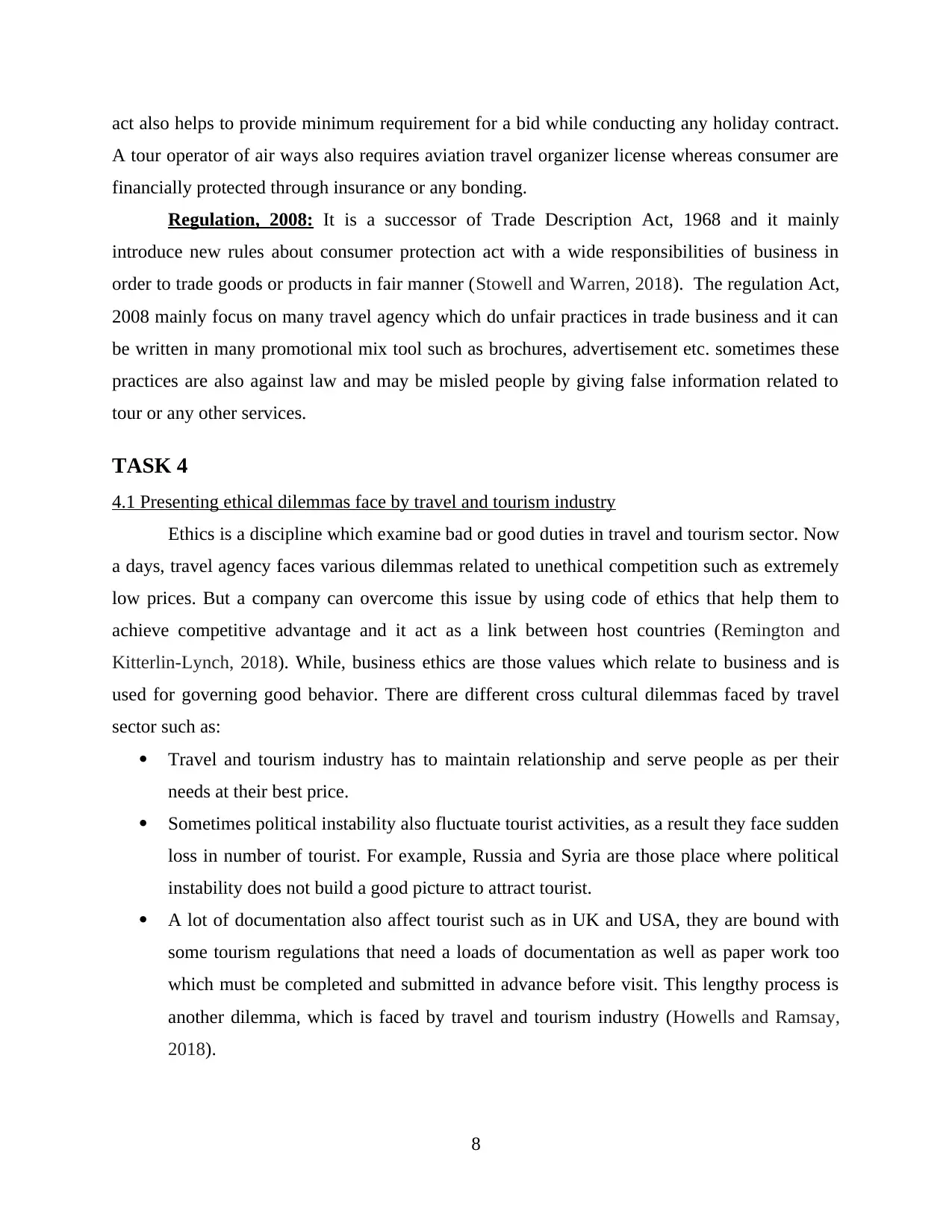
act also helps to provide minimum requirement for a bid while conducting any holiday contract.
A tour operator of air ways also requires aviation travel organizer license whereas consumer are
financially protected through insurance or any bonding.
Regulation, 2008: It is a successor of Trade Description Act, 1968 and it mainly
introduce new rules about consumer protection act with a wide responsibilities of business in
order to trade goods or products in fair manner (Stowell and Warren, 2018). The regulation Act,
2008 mainly focus on many travel agency which do unfair practices in trade business and it can
be written in many promotional mix tool such as brochures, advertisement etc. sometimes these
practices are also against law and may be misled people by giving false information related to
tour or any other services.
TASK 4
4.1 Presenting ethical dilemmas face by travel and tourism industry
Ethics is a discipline which examine bad or good duties in travel and tourism sector. Now
a days, travel agency faces various dilemmas related to unethical competition such as extremely
low prices. But a company can overcome this issue by using code of ethics that help them to
achieve competitive advantage and it act as a link between host countries (Remington and
Kitterlin-Lynch, 2018). While, business ethics are those values which relate to business and is
used for governing good behavior. There are different cross cultural dilemmas faced by travel
sector such as:
Travel and tourism industry has to maintain relationship and serve people as per their
needs at their best price.
Sometimes political instability also fluctuate tourist activities, as a result they face sudden
loss in number of tourist. For example, Russia and Syria are those place where political
instability does not build a good picture to attract tourist.
A lot of documentation also affect tourist such as in UK and USA, they are bound with
some tourism regulations that need a loads of documentation as well as paper work too
which must be completed and submitted in advance before visit. This lengthy process is
another dilemma, which is faced by travel and tourism industry (Howells and Ramsay,
2018).
8
A tour operator of air ways also requires aviation travel organizer license whereas consumer are
financially protected through insurance or any bonding.
Regulation, 2008: It is a successor of Trade Description Act, 1968 and it mainly
introduce new rules about consumer protection act with a wide responsibilities of business in
order to trade goods or products in fair manner (Stowell and Warren, 2018). The regulation Act,
2008 mainly focus on many travel agency which do unfair practices in trade business and it can
be written in many promotional mix tool such as brochures, advertisement etc. sometimes these
practices are also against law and may be misled people by giving false information related to
tour or any other services.
TASK 4
4.1 Presenting ethical dilemmas face by travel and tourism industry
Ethics is a discipline which examine bad or good duties in travel and tourism sector. Now
a days, travel agency faces various dilemmas related to unethical competition such as extremely
low prices. But a company can overcome this issue by using code of ethics that help them to
achieve competitive advantage and it act as a link between host countries (Remington and
Kitterlin-Lynch, 2018). While, business ethics are those values which relate to business and is
used for governing good behavior. There are different cross cultural dilemmas faced by travel
sector such as:
Travel and tourism industry has to maintain relationship and serve people as per their
needs at their best price.
Sometimes political instability also fluctuate tourist activities, as a result they face sudden
loss in number of tourist. For example, Russia and Syria are those place where political
instability does not build a good picture to attract tourist.
A lot of documentation also affect tourist such as in UK and USA, they are bound with
some tourism regulations that need a loads of documentation as well as paper work too
which must be completed and submitted in advance before visit. This lengthy process is
another dilemma, which is faced by travel and tourism industry (Howells and Ramsay,
2018).
8
Paraphrase This Document
Need a fresh take? Get an instant paraphrase of this document with our AI Paraphraser
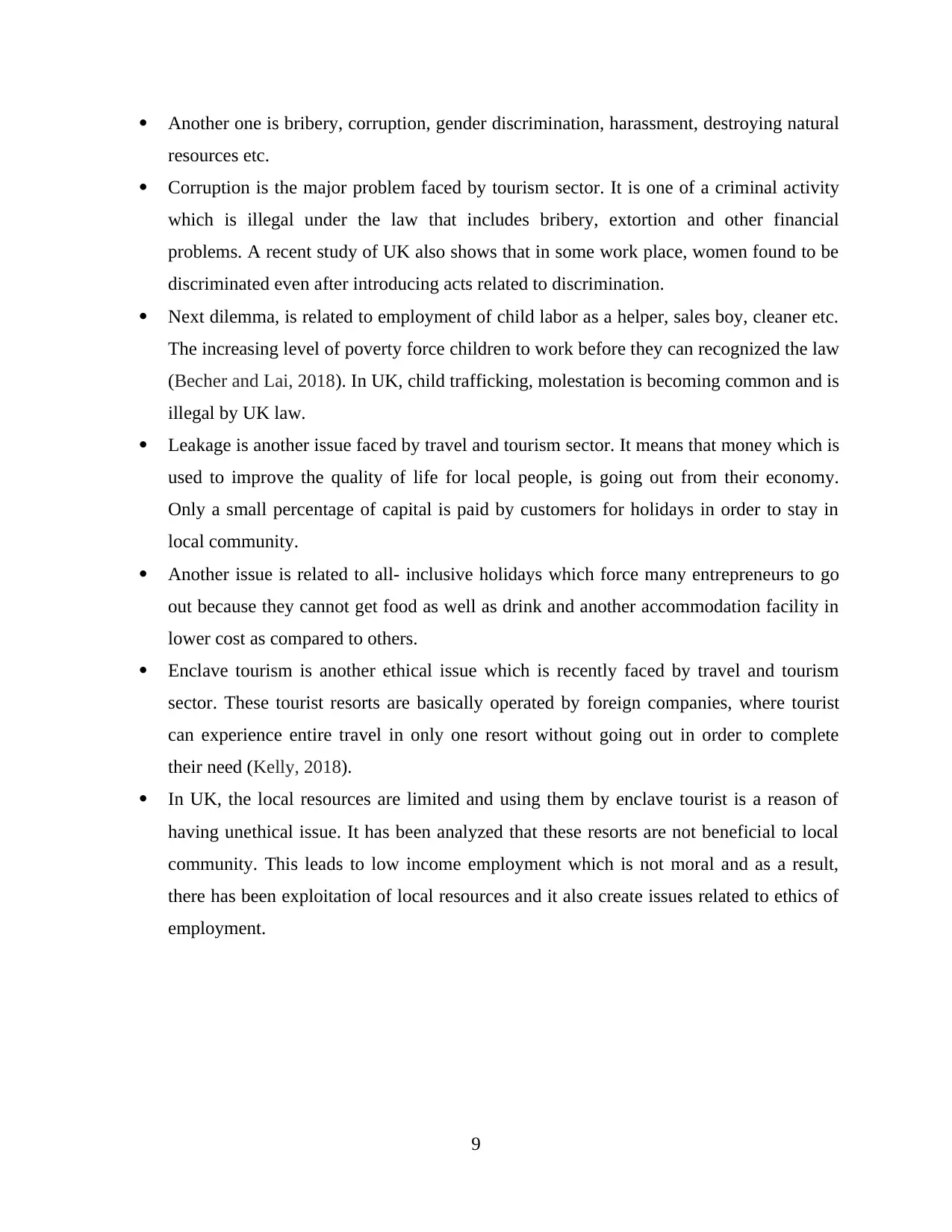
Another one is bribery, corruption, gender discrimination, harassment, destroying natural
resources etc.
Corruption is the major problem faced by tourism sector. It is one of a criminal activity
which is illegal under the law that includes bribery, extortion and other financial
problems. A recent study of UK also shows that in some work place, women found to be
discriminated even after introducing acts related to discrimination.
Next dilemma, is related to employment of child labor as a helper, sales boy, cleaner etc.
The increasing level of poverty force children to work before they can recognized the law
(Becher and Lai, 2018). In UK, child trafficking, molestation is becoming common and is
illegal by UK law.
Leakage is another issue faced by travel and tourism sector. It means that money which is
used to improve the quality of life for local people, is going out from their economy.
Only a small percentage of capital is paid by customers for holidays in order to stay in
local community.
Another issue is related to all- inclusive holidays which force many entrepreneurs to go
out because they cannot get food as well as drink and another accommodation facility in
lower cost as compared to others.
Enclave tourism is another ethical issue which is recently faced by travel and tourism
sector. These tourist resorts are basically operated by foreign companies, where tourist
can experience entire travel in only one resort without going out in order to complete
their need (Kelly, 2018).
In UK, the local resources are limited and using them by enclave tourist is a reason of
having unethical issue. It has been analyzed that these resorts are not beneficial to local
community. This leads to low income employment which is not moral and as a result,
there has been exploitation of local resources and it also create issues related to ethics of
employment.
9
resources etc.
Corruption is the major problem faced by tourism sector. It is one of a criminal activity
which is illegal under the law that includes bribery, extortion and other financial
problems. A recent study of UK also shows that in some work place, women found to be
discriminated even after introducing acts related to discrimination.
Next dilemma, is related to employment of child labor as a helper, sales boy, cleaner etc.
The increasing level of poverty force children to work before they can recognized the law
(Becher and Lai, 2018). In UK, child trafficking, molestation is becoming common and is
illegal by UK law.
Leakage is another issue faced by travel and tourism sector. It means that money which is
used to improve the quality of life for local people, is going out from their economy.
Only a small percentage of capital is paid by customers for holidays in order to stay in
local community.
Another issue is related to all- inclusive holidays which force many entrepreneurs to go
out because they cannot get food as well as drink and another accommodation facility in
lower cost as compared to others.
Enclave tourism is another ethical issue which is recently faced by travel and tourism
sector. These tourist resorts are basically operated by foreign companies, where tourist
can experience entire travel in only one resort without going out in order to complete
their need (Kelly, 2018).
In UK, the local resources are limited and using them by enclave tourist is a reason of
having unethical issue. It has been analyzed that these resorts are not beneficial to local
community. This leads to low income employment which is not moral and as a result,
there has been exploitation of local resources and it also create issues related to ethics of
employment.
9
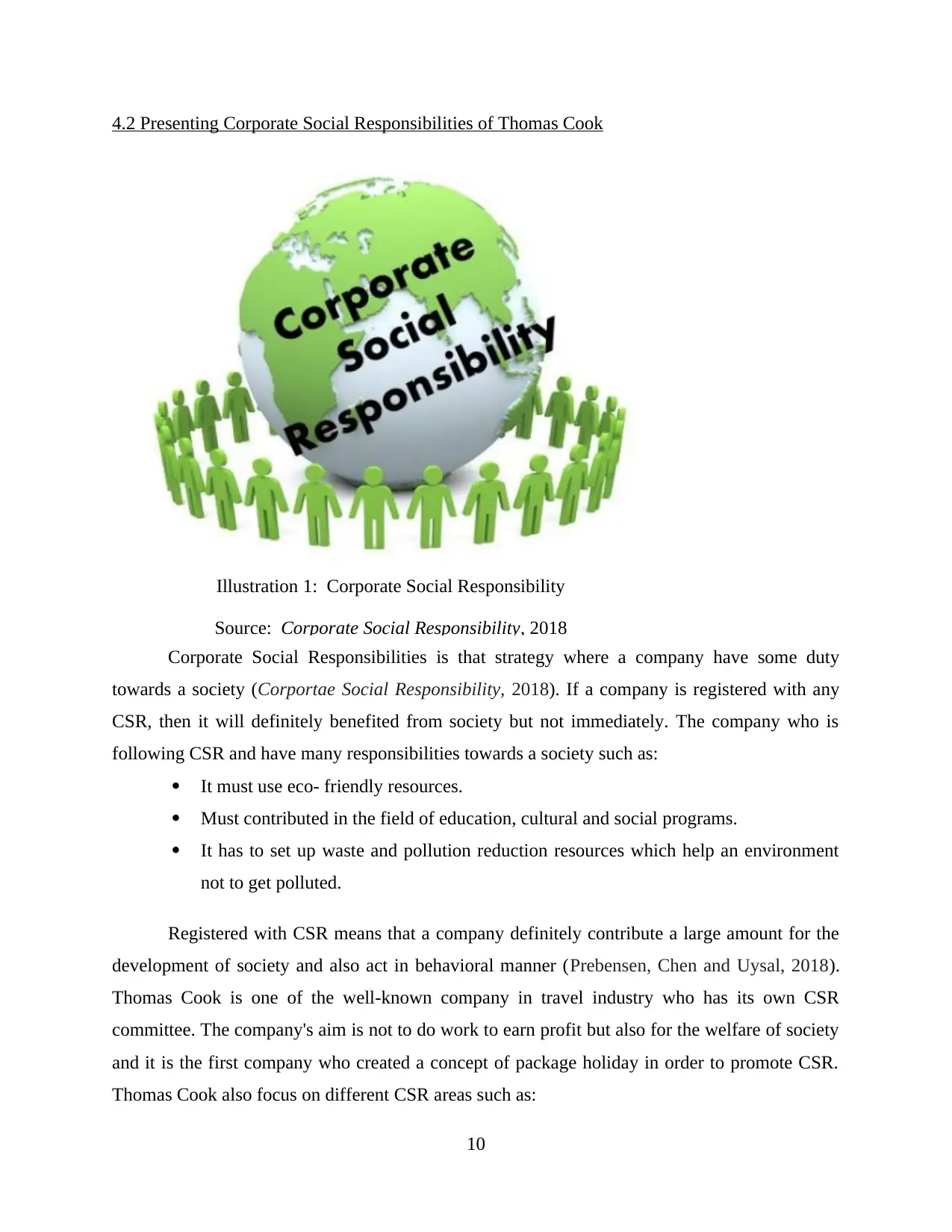
4.2 Presenting Corporate Social Responsibilities of Thomas Cook
Illustration 1: Corporate Social Responsibility
Source: Corporate Social Responsibility, 2018
Corporate Social Responsibilities is that strategy where a company have some duty
towards a society (Corportae Social Responsibility, 2018). If a company is registered with any
CSR, then it will definitely benefited from society but not immediately. The company who is
following CSR and have many responsibilities towards a society such as:
It must use eco- friendly resources.
Must contributed in the field of education, cultural and social programs.
It has to set up waste and pollution reduction resources which help an environment
not to get polluted.
Registered with CSR means that a company definitely contribute a large amount for the
development of society and also act in behavioral manner (Prebensen, Chen and Uysal, 2018).
Thomas Cook is one of the well-known company in travel industry who has its own CSR
committee. The company's aim is not to do work to earn profit but also for the welfare of society
and it is the first company who created a concept of package holiday in order to promote CSR.
Thomas Cook also focus on different CSR areas such as:
10
Illustration 1: Corporate Social Responsibility
Source: Corporate Social Responsibility, 2018
Corporate Social Responsibilities is that strategy where a company have some duty
towards a society (Corportae Social Responsibility, 2018). If a company is registered with any
CSR, then it will definitely benefited from society but not immediately. The company who is
following CSR and have many responsibilities towards a society such as:
It must use eco- friendly resources.
Must contributed in the field of education, cultural and social programs.
It has to set up waste and pollution reduction resources which help an environment
not to get polluted.
Registered with CSR means that a company definitely contribute a large amount for the
development of society and also act in behavioral manner (Prebensen, Chen and Uysal, 2018).
Thomas Cook is one of the well-known company in travel industry who has its own CSR
committee. The company's aim is not to do work to earn profit but also for the welfare of society
and it is the first company who created a concept of package holiday in order to promote CSR.
Thomas Cook also focus on different CSR areas such as:
10
⊘ This is a preview!⊘
Do you want full access?
Subscribe today to unlock all pages.

Trusted by 1+ million students worldwide
1 out of 16
Related Documents
Your All-in-One AI-Powered Toolkit for Academic Success.
+13062052269
info@desklib.com
Available 24*7 on WhatsApp / Email
![[object Object]](/_next/static/media/star-bottom.7253800d.svg)
Unlock your academic potential
Copyright © 2020–2026 A2Z Services. All Rights Reserved. Developed and managed by ZUCOL.





